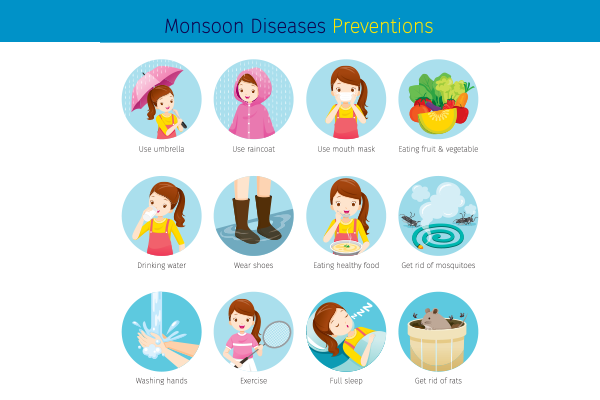
Every year, the arrival of the monsoon brings essential relief from the scorching heat; however, there is no denying that it also brings about the optimal environment for the development of waterborne diseases. With one of the best departments of infectious diseases in Baner, Pune. We see a surge in infection cases every year during the monsoon season. Therefore, it is important to understand what waterborne diseases are, the causes of waterborne diseases, and how to prevent waterborne diseases. In this blog, we at the Department of Infectious Diseases in Baner, Pune, aim to offer you effective and practical monsoon hygiene tips to prevent waterborne diseases, tailored for your convenience.
Synopsis
What are Waterborne Diseases?
Waterborne diseases are described as illnesses that are caused due to the consumption or coming into close contact with contaminated water. The harmful pathogens that are responsible for this contamination range from bacteria to parasites. Some common examples of waterborne diseases include typhoid, cholera, gastroenteritis, and hepatitis A. These diseases can result in symptoms such as dehydration, fever, and diarrhoea. It is noteworthy that they are mainly dangerous for the elderly, children, and immunocompromised individuals.
Causes of Waterborne Diseases during Monsoon Season
All the primary causes of waterborne diseases are closely associated with the rainy season. Heavy rainfall frequently leads to issues such as waterlogging and flooding, which can pollute water sources with waste and sewage. In addition, complications like pipe leakage, inadequate sanitation, and faulty drainage elevate this risk. When people consume, wash, or cook with this water, they become highly susceptible to infection. Therefore, in this context, understanding the causes of waterborne diseases becomes even more significant.
4 Types of Water-related Diseases
|
Disease Type |
Explanation and Example |
|
Waterborne Diseases |
Caused due to ingestion of contaminated water (typhoid, hepatitis A, and cholera) |
|
Water-washed diseases |
Caused due to a lack of clean water for hygienic purposes (eye and skin infection) |
|
Water-based diseases |
Caused by a parasite that inhabits water (schistosomiasis) |
|
Water-vector diseases |
Caused due to insects breeding in water (dengue, malaria) |
By understanding these 4 types of water-related diseases, you can be more informed on how to prevent waterborne diseases more effectively.
Monsoon Hygiene Tips to Prevent Waterborne Diseases
- Only drink safe water.
Either use an authentic water purifier or at least boil water for a minute. You must remember that even if your water looks clear in appearance, it may still contain germs. Safe water is always your initial line of defence against waterborne diseases.
- Prioritise proper water storage.
Utilise covered and clean containers to store your drinking water. Do not dip dirty utensils or hands into the container. Disinfect and clean these storage vessels habitually to prevent the causes of waterborne diseases.
- Maintain good hand hygiene.
Wash your hands rigorously with soap and clean water before eating, coming into close contact with possibly contaminated surfaces, and after using the toilet. Adequate hand hygiene is considered to be one of the best monsoon hygiene tips to prevent waterborne diseases.
- Keep away from raw produce and street food.
Make sure to avoid eating from roadside vendors this season or consuming unwashed and raw vegetables and fruits. Cook food properly and wash produce with clean water to decrease the possibility of waterborne diseases.
- Always maintain clean surroundings.
Get rid of stagnant water around your house to prevent mosquitoes from breeding. Clean water tanks, gutters, and drains frequently. Maintaining a sanitary environment assists in the prevention of both waterborne and foodborne diseases.
- Use sanitised lavatories.
Make sure to use clean toilets and that the waste gets disposed of properly. Inadequate sanitation and open defecation are primary causes of waterborne diseases, particularly during the monsoons.
- Stay updated and vaccinated.
Make sure that you are updated to warrant informed decision-making on vaccination, such as hepatitis A and typhoid. Awareness and timely immunisation are significant monsoon hygiene tips to prevent waterborne diseases.

Conclusion
Although the rainy season is a joyful time of the year, it also brings a risk of waterborne diseases. By understanding what waterborne diseases are, the causes of waterborne diseases, the 4 types of water-related diseases, and how to prevent waterborne diseases, you can keep your family safe. At the Infectious Diseases Treatment Hospital in Baner, Pune, we are here to help you stay healthy and protected. Book an appointment with an expert today!
Prevention is always better than a cure—stay clean, and enjoy a healthy monsoon!
FAQ's
Waterborne diseases are infections that are caused by the consumption of water that is contaminated with harmful pathogens. Their incidence tends to surge during the rainy season due to waterlogging, contamination of water sources, and flooding.
The primary causes of waterborne diseases during the monsoon season include using or drinking contaminated water, inadequate sanitation, and inappropriate waste disposal.
The 4 types of water-related diseases are: waterborne diseases, water-washed diseases, water-based diseases, and water-related insect vector diseases.
To prevent water-borne diseases, drink only boiled or purified water, store water safely, wash hands regularly, avoid raw or street food, stay vaccinated, and maintain a clean environment.
Parents should ensure kids drink only safe water, wash their hands frequently, avoid playing in stagnant water, and eat only home-cooked meals during the monsoon.






















 5 Min Read
5 Min Read














